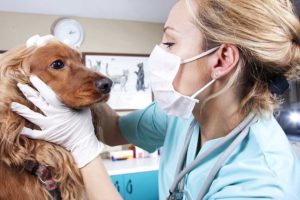Disclaimer: The information on our website is provided for general information purposes only. We make no representations or warranties of any kind, express or implied, about the completeness, accuracy, reliability, suitability or availability with respect to the website or the information contained on our website for any purpose. Any reliance on such information is therefore strictly at your own risk and we are not liable for any damages or losses arising out of or resulting from your reliance on any information contained on our website.
A veterinarian is a doctor that treats animals. They examine, diagnose, and treat animals of all kinds and may often perform surgery. Just like a doctor working in the medical field helping people, veterinarians are also trained to use modern medical equipment and surgical tools. Veterinarians work in many settings such as vet clinics, veterinary hospitals, zoos, and laboratories. They may also work on the road taking house calls or visiting farms. Watch a video to learn what a veterinarian does:
How to Become a Veterinarian

To become a veterinarian, you must earn a Doctor of Veterinary Medicine (D.V.M.) degree at an accredited college. To be a competitive applicant for vet school, most students complete a bachelor’s degree before applying. Schools reviewing student applications will look for students who are well prepared to be successful throughout the challenging curriculum. Therefore, they will look for those students who have taken biology, chemistry, zoology, or other related courses.
An accredited veterinary program takes about four years to complete and will have a classroom, lab, and clinical components. Along with math, humanities, and science courses, the program may also have business management and career development courses. These courses prepare new veterinary graduates to manage a practice. The curriculum is meant to ensure you are a successful veterinary practitioner and well prepared to pass the North American Veterinary Licensing Exam (NAVLE). Passing this exam is necessary to become certified in order to gain a license to practice.
Job Description of a Veterinarian
Most people think veterinarians work in private clinical practices and treat illnesses or injuries of pets or other animals. Though this is primarily true there are also specialized areas one can work in. Examples include equine, food safety and inspection, research, or other veterinary based services. Some become postsecondary teachers at colleges or universities. That said, a typical veterinarian in private clinical practice would normally examine an animal and determine their medical needs and treat the animal.
Veterinarians care for animal’s wounds and dress them, as well as, give vaccinations to animals and give tests for possible diseases, like heartworm or other illnesses. They use a variety of medical equipment, such as X-ray and ultrasound machines or surgical tools. They prescribe medication for animals and educate people about the basic care and needs of their pet or animal, their medical condition or treatment plan.
Teacher and Student Resources
Wageningen University offers a free course on EdX.or titled an Introduction to Animal Behavior. This course covers the key concepts to understand the range and complexity of animal behavior.
Veterinarian Career Video Transcript
An apple a day may keep the doctor away, but man’s best friend needs a checkup once in a while no matter how healthy its diet is. Veterinarians diagnose, treat, and research medical conditions and diseases of pets, livestock, and other animals. Veterinarians treat illnesses and injuries, conduct surgical and medical procedures and dental work, and vaccinate animals against diseases. They also teach owners preventive healthcare.
Veterinarians have different types of practices. Companion animal veterinarians most often work at clinics and care for cats and dogs, but also treat other pets, such as birds, ferrets, and rabbits. Equine veterinarians work with horses involved in performing, farming and racing. Food animal veterinarians work at farms and ranches to treat farm animals such as pigs, cattle, and sheep. Food safety and inspection veterinarians inspect and test livestock and animal products for major animal diseases, and work to improve animal health and reduce disease transmission. They also enforce food safety regulations. Research veterinarians work in laboratories, conducting clinical research on human and animal health problems and may test the effects of drug therapies or new surgical techniques.
Veterinarians must have a Doctor of Veterinary Medicine degree, usually a 4-year program, and pass the North American Veterinary Licensing examination. Veterinary school is highly competitive and typically requires applicants to have taken many science classes in college.
Article Citations
Bureau of Labor Statistics, U.S. Department of Labor, Occupational Outlook Handbook, Veterinarians.
National Center for O*NET Development. 29-1131.00. O*NET OnLine.

